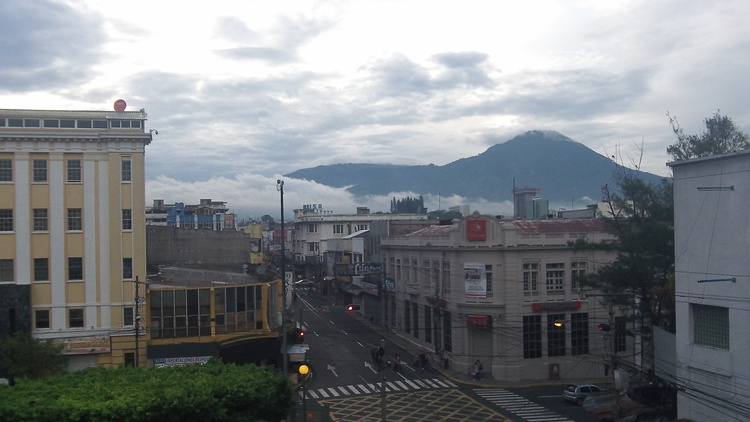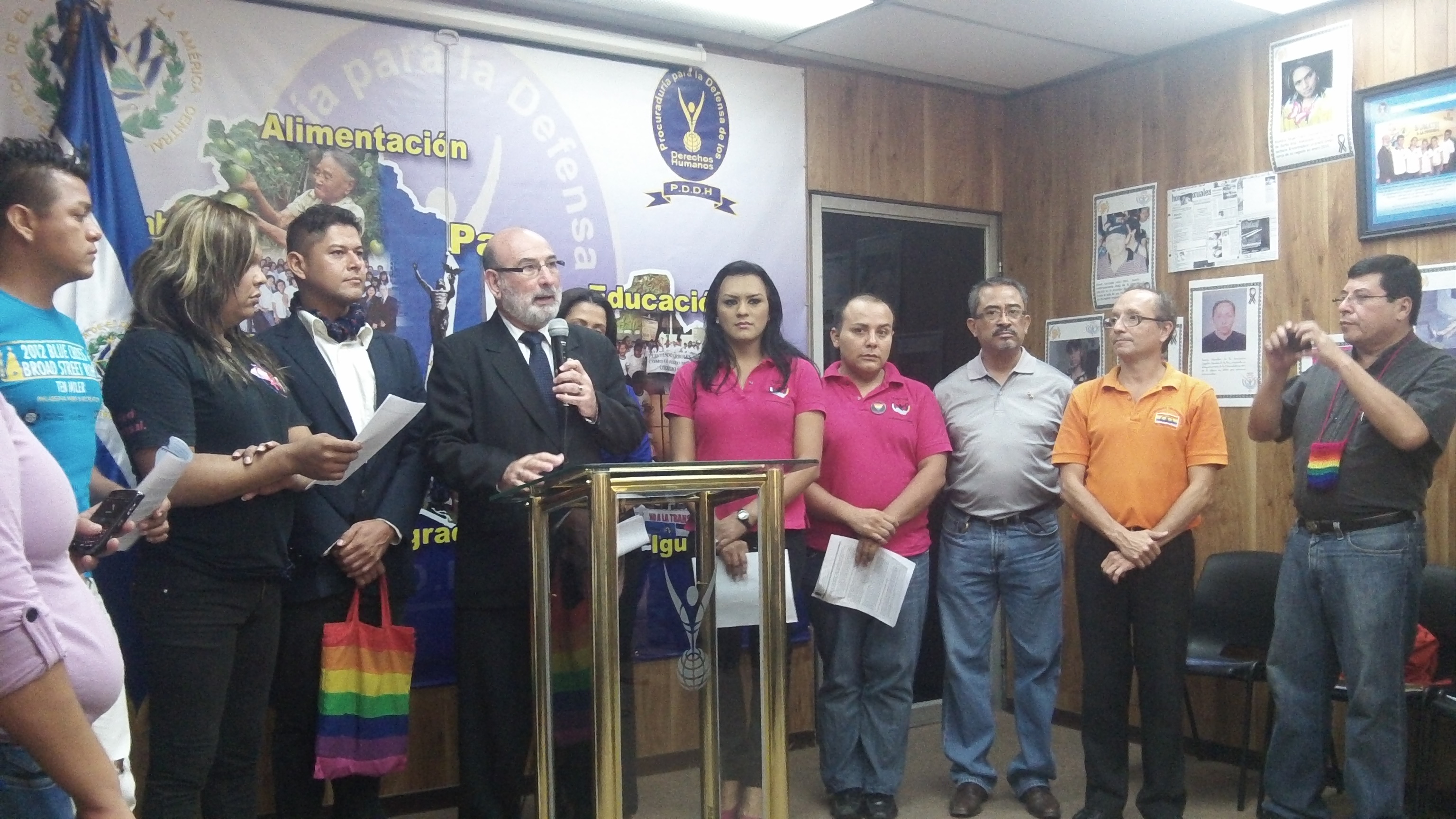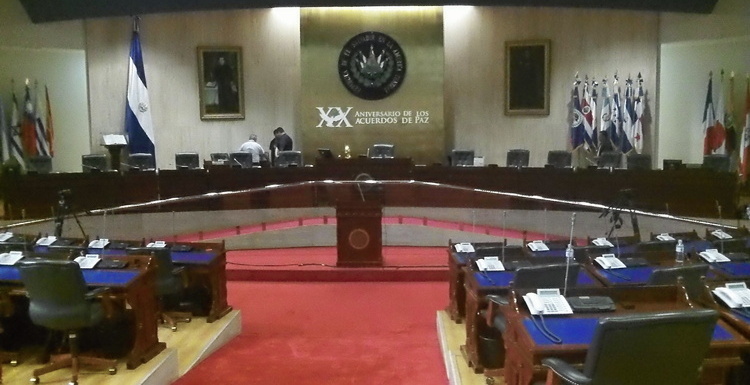Between Corporate Power and Human Rights in El Salvador: Public-Private Partnership Law and Free Trade Agreement with the European Union are Signed into Law
Although ostensibly governed from the left, El Salvador has adopted several initiatives to strengthen transnational corporate privileges, leaving human rights increasingly vulnerable to violation. Two new provisions passed by the country’s legislative assembly—a free trade pact with the European Union and a public-private partnership law—aim to increase foreign investment. Yet, recent Salvadoran agreements that are similar in their intent and scope have opened the door to human rights violations in the country. Meanwhile, the legislative assembly has been unable to pass an initiative vital to assuring respect for basic human rights, in this case a proposed law that would have guaranteed access to potable water in the country. This situation is part of a region-wide wave of “hard law” tactics aimed at streamlining and solidifying access for transnational corporations to the markets and natural resources of the global south. These hard laws do not take human rights into account; and because the international structure of human rights protection is framed in “soft” law, that is, more custom than black letter law, an imbalance results when these two systems clash, leaving corporate privilege stronger than human rights.
Hard law refers to binding, enforceable provisions that include punishment for their violation—oftentimes an expensive fine or incarceration. Domestic laws are usually hard law. On the international scene, commercial trade laws mostly are, too. Soft law refers to non-binding, un-enforceable statements of intent. The purpose of soft laws is to generate agreement around certain standards, but until those standards pass into hard law, they are violable with relative impunity. International human rights pacts, like those from the United Nations or the Inter American system, constitute soft law. As Manuel Perez-Rocha, Associate Fellow at Institute for Policy Studies, explains: “We have to understand that governments sign human rights agreements due to social pressure, and they are non-binding, soft-law treaties. They sign commercial treaties because of pressure by investors, and these are binding, hard-law treaties. So who has more real power? Transnationals assure (ensure?) the upper hand by imposing financial punishments, whereas human rights treaties don’t include financial punishment.” [1]
This imbalance becomes a problem when commercial activity violates human rights because it leaves authorities with few tools to right the wrongs. A recent example is base metal mining in El Salvador. The Salvadoran government refused to allow mining in its territory, given that multiple studies show it would threaten the human rights of more than 60% of the population. Two North American mining companies responded by suing the government for $415 million. The companies used investor’s protections provisions written into CAFTA, the free trade agreement that El Salvador signed with the United States in 2005, which allows investors to sue for discriminatory treatment in a special system of justice set up for trade disputes and administered by the World Bank. In this tribunal, known as the International Centre for Settlement of Investment Disputes (ICSID), human rights are not considered when deciding whether corporate activity should be allowed. These cases are still in arbitration; meanwhile, the Salvadoran government has already paid nearly $5 million USD in legal fees, and could have to pay hundreds of millions more, because it chose to defend democracy and human rights over corporate privilege. [2]

Photo source: Danielle Marie Mackey

Photo source: Danielle Marie Mackey
Several Latin American countries that faced similar problems in the ICSID decided to break the trade agreements they signed that put them within the court’s jurisdiction. [3] This is not the case for El Salvador, according to Dr. Angel Ibarra, the Executive Director of the Unidad Salvadoreña Ecologica (The Salvadoran Ecological Unit – UNES): “Athough CAFTA has brought no benefits to El Salvador, the incredible thing is that we continue to seek out these types of agreements.” [4]
Dr. Ibarra referred to two laws that the government recently passed, the Public-Private Partnership Law (P3), and the Association Free Trade Agreement with the European Union (ADA). Both are hard laws that increase corporate involvement in the public sector, and both allow use of the ICSID tribunal, among other investor protections. P3 and ADA supporters argue that the initiatives are important for development, and deny that they are veiled moves toward privatization— [5] something they’re careful to articulate publically, given the energetic protests and violence that surrounded a 2007 attempt to privatize water. [6] However, critics’ fear is that P3 and ADA offer corporations newfound power to restrict El Salvador’s sovereignty to protect human rights and observe democratic practices, whether due to privatization or another case before the ICSID. [7] This fear came true with mining, and it happened because of measures that reappear in P3 and ADA. Critics insist that the two measures spell out an assortment of corporate privileges without undergirding it with human rights protections, thus continuing to tilt the imbalance between human rights and corporate privileges.
Public-Private Partnership Law (P3)
The Public-Private Partnership law (P3) establishes a formal mechanism to configure joint government and corporate investment on public projects. It began as a controversial proposal that the governing Frente Farabundo Marti para la Liberacion Nacional (The Farabundo Marti National Liberation Front -FMLN) promised to vote against when the bill was introduced to the Legislative Assembly in 2011. [8] However, in 2012 the party suddenly warmed to the measure, tweaked it a bit, and reintroduced it to the chamber. It unanimously passed on May 23, 2013. [9] The objective of the P3 is to involve the private sector in public services and to increase foreign direct investment. P3’s allow more private involvement in the management of public goods, and the criticisms of this approach to development are plentiful. However, on the particular subject of corporate privilege and human rights, several aspects weight the balance toward the former.
A primary concern is the amount of time during which control of the public sector in question is conceded to the private investor: 40 years. A 2011 study by La Fundacion de Estudios para la Aplicacion del Derecho (The Foundation for the Study of the Application of the Law – FESPAD) and Voices on the Border (Voices) is the only one in existence that analyzes the P3 and its potential impacts. [10] According to this study, a four-decade concession is an extraordinarily long period to go with very little government or legislative oversight. Once the contract is signed, the private partner has basically free rein to operate and set prices for the services it provides, with very few limitations (Voices, P5). This means that profit-driven decision-making will govern public goods and probably make them more expensive for individuals, which, in a country with widespread poverty like El Salvador, will limit many peoples’ access to those public goods.
The sectors in which private companies can invest is another major concern the report cites. Given the country’s recent history with loss of control of natural resources, especially its water, this is a salient issue. P3 does at least seem to exclude some sectors: water, the health sector, social security, public safety and public education are off-limits. However, the report points out, “The mention of these sectors only appears on two lines of the bill and is legally vague. Without elaboration or a more specific prohibition, it would be easy for the government to expand P3s into these areas”(Voices, P5). Indeed, on the day the bill was passed, the most influential parties on the political right—La Alianza Republicana Nacionalista (The Nationalist Republican Alliance – ARENA), El Partido de Conciliacion Nacional (The National Coalition – PCN), and El Partido Democrata Cristiano (The Christian Democratic Party – PDC)—attempted a last-minute addition of water to the list of allowable sectors. When the attempt was blocked, party representatives said it was a “shame” and characterized the desire to safeguard water from private investment as an “ideological…limitation on investment in infrastructure in the country that could have improved water service.” However, the trio of parties suggested that in the coming months they would attempt to modify the law, insisting, “all laws are perfectible.” [11] Human rights groups worry that this is foreshadowing of future attempts to expand the reach of the P3 to water, education and security, among other important public sectors.
The P3 furthermore seems to pander to international investment at the expense of local human rights. The report found that the P3 “’require[s] that the Government of El Salvador foster a more conducive investment environment’…The bill has an implicit commitment to promoting the kind of legislation that will be as favorable to foreign business as possible.” (Voices P7) While that may sound innocuous in theory, what that means in practice is lowering barriers to profit. Oftentimes, that translates into pressure that supersedes human rights concerns. For instance, one way that the P3 “fosters a conducive investment environment” is by allowing ICSID arbitration in investment disputes—the same tool that transnational corporations used to overpower human rights and democracy in the case of mining.
Meanwhile, the bill does nothing to support or strengthen domestic businesses. Instead, it will only add to the wave of international investment by continuing to erase barriers to transnational activity in the country. And as El Salvador has already experienced, the system of international investment does not protect human rights as stringently as it does corporate privileges. The P3 does not include any new human rights protections that address that reality.

Photo source: Danielle Marie Mackey
Association for Development (ADA)
The ADA was proposed in 2010 and passed with an overwhelming majority in favor, 82 of 84 votes by the Salvadoran Legislative Assembly on July 5, 2013. Its stated objective is to strengthen commerce, international cooperation, and political dialogue between the European Union and Central American nations.
CAFTA is a similar free trade agreement that El Salvador signed with the US in 2005. It is important to consider ADA alongside its predecessor because of the remarkable similarities between the two agreements. The comparison does not end favorably for either: CAFTA has not delivered the benefits it was supposed to for El Salvador. It has not decreased poverty or increased jobs in the country (Baños, 2013). [12] Legislators who voted for ADA admitted the disappointing economic results from its predecessor, and expressed concern about the uneven playing field between the EU and El Salvador. However, they explained their pro-ADA vote by pointing out that this agreement includes positives that CAFTA does not: it promises international cooperation development funds from European countries as well as the opening of a dialogue that could help build positive relationships between the regions. One key problem, however, is that ADA, like CAFTA, seems to privilege corporate power over human rights and democratic principles.
CAFTA has been used to advance corporate interests even when they severely threaten human rights, as seen in the case of mining. Indeed, even before the ICSID lawsuits fully unfolded, the effects of CAFTA were so clearly damaging that impacted citizens filed a case in 2007 against the free trade agreement before the Salvadoran Supreme Court. The case is still under adjudication. Given how similar the European version of the agreement is, these organizations are now arguing that, according to Article 145 of the Constitution, ADA never should have been able to be ratified until the constitutionality of its predecessor was determined. [13]
In 2007 the Supreme Court admitted 11 arguments of unconstitutionality to the CAFTA case, including “the principles of ‘National Treatment’ and ‘indirect expropriation,’ which require the state to give foreign firms the same benefits given to Salvadoran firms and defines any governmental action or inaction that harms potential [foreign] investment earnings as an injury that allows foreign firms to sue El Salvador under international trade tribunals, bypassing national justice mechanisms.” [14] These principals also appear in ADA. Indeed, civil society points not only to national treatment and indirect expropriation as worrisome, but also to provisions that govern market access, public contracts, investments, cross-border commerce in services and intellectual property, and the use of ICSID tribunal as clauses that bring “violations of constitutional rights [in the same way that … ] CAFTA does.” [15]
In fact, as Alejandro Labrador of La Mesa Nacional Frente a la Mineria Metalica (The National Working Group Against Metal Mining in El Salvador – “The Mesa”) notes, “The commercial conditions in CAFTA are the minimum base from which the ADA negotiations were built. Not only is the jurisdiction of the CIADI recognized, but also other corporate tribunals in the European Union.” [16] As The Mesa’s press release of June 18, 2013 explains, “[the pacts’] purpose is to ensure that European transnationals are competitive with US transnationals by building a legal framework that allows for that.” [17]
In other words, ADA seeks to ensure the same power for European transnational corporations as their US counterparts enjoy. ADA’s central norms that establish this power are possibly unconstitutional. Even if they are found by the high court to be constitutional, such measures have been used to trample democracy and violate human rights in El Salvador in the recent past. The Mesa’s June 18, 2013 press release highlights the imbalance created by the hard law/soft law differential:
These commercial norms tend to protect transnational businesses to the detriment of the human rights of the population and the environment, especially because they do not pay sufficient attention to the clear asymmetries between Europe and our countries. This is aggravated by the fact that the ADA establishes a double standard of protection: while the commercial [concerns can employ …] coercive mechanisms to [protect their interests …] the human rights [are defended only with very …] weak mechanisms, […] better described as exhortative expressions, which make it impossible to achieve results that are favorable for people. This fact has caused even the Social Democrats in Germany to object to the agreement in the German parliament.
Water as a Human Right
Meanwhile, the passage of a local law that would strengthen a human right has proven impossible in El Salvador for five years running. The law would guarantee access to potable water for Salvadoran citizens by defining water not as merchandise but instead as a human right. It would mandate the use of state resources toward maintaining a functioning public water system. The law would head off the potential privatization of water via P3 by making such a move illegal. As a hard law, it would be a rare circumstance where human rights enjoy the same power as corporate hard laws.
The water law, proposed by a civil society coalition to the Legislative Assembly five years ago, would implement a United Nations resolution that defines water as a human right. The Salvadoran government has already signed this international accord, and thus is obligated to enforce it locally. [18] “But El Salvador simultaneously has signed free trade agreements and bilateral investment treaties, and continues to apply neoliberal policies that practically asphyxiate the UN model and make it unviable to implement the UN norm of water as a fundamental human right,” explains Dr. Angel Ibarra of UNES. He adds that, “We stand before that obligation with arms crossed. There is no institutional strength, nor financial resources, nor political will to implement it.”
Passage of the water law would be a step toward bringing El Salvador into accordance with the U.N. treaty. However, its legislature has been unable to do so. Because U.N. treaties are framed in soft law, there is no punishment for noncompliance. In the meantime, P3 and ADA passed easily through the same legislature.
The reason for the imbalance between human rights and corporate privilege is the hard vs. soft law dynamic. The type of initiative represented by the water law is a good way to right the imbalance. Another answer would be to stop signing agreements that reinforce the power imbalance, like the P3 and ADA. Why is the Salvadoran government choosing the opposite in both cases?
Power and Priorities
In El Salvador it has long been the case that laws that prove inconvenient for local and international elite are just ignored. As Dr. Ibarra, explains:
The laws here are not equal. Here, there are some laws that are implemented: for instance, dollarization in 2001, implemented in fewer than 21 days and followed up immediately by who-knows-how-many regulations for implementation. The banking law is also implemented. You understand. But the environmental law is not. Only the laws at the service of the powerful are implemented.
Outside pressure on local political elites created the hard law that, for instance, gave mining companies a forum to subvert El Salvador’s national sovereignty. This pressure to ease entry for transnational corporations to the markets and natural resources of the global south has profit as an end goal. Corporate privileges written into P3 and ADA are fruits of that same pressure. In the cases of CAFTA, P3, and ADA, the Salvadorans who negotiated the treaties with international representatives were local political and economic elites. “That includes the technical secretariat of the presidential administrations of the time, along with the real power sector in this country, which doesn’t get voted out every five years: the ‘Council for Growth,’” explained Saul Antonio Baños of FESPAD. Baños listed some principal members—last names from El Salvador’s infamous 14-family oligarchy: Poma, Calleja, Sola, Mura y Mesa. “These people are interested in foreign investment because transnational businessmen will contact them,” said Baños. These people—the Salvadorans with most direct access to the final terms of P3 and ADA, according to Baños—will also be the direct beneficiaries of these agreements.
International power dynamics also played a leading role in driving the agreements through the legislature. In the case of the P3, the U.S. government leaned heavily on Salvadoran lawmakers to pass the proposal, even conditioning the passage of the second round of hundreds of millions of dollars in development funds under the Millennium Challenge Corporation on whether the law passed. [19] The U.S. Ambassador to El Salvador, Mari Carmen Aponte, made headlines when she made a public appeal to senators shortly before the law was put to a vote, asking them to pass it “for the good of the country.” [20] According to the Voices/FESPAD P3 analysis report:
It is no surprise that the P3 initiative has arisen in the immediate aftermath of signing the Partnership for Growth between the U.S. and El Salvador in November 2011. The agreement identifies crime & security and low productivity in tradables as the two critical constraints on El Salvador’s development. Explicitly, the second constraint ‘require[s] that the Government of El Salvador foster a more conducive investment environment’ while the United States will assist the GOES in ‘improv[ing] internal coordination’ (U.S. Department of State, 2011) (Voices P7).
With ADA, civil society groups point out that the region receives important international cooperation funds from the EU already. The inclusion of those funds in ADA was a veiled threat to withdraw support if the region did not open its markets to European businesses, explains Saul Baños.
The move to protect human rights through the water law has been stymied by an economic elite in El Salvador that has already attempted water privatization once and vowed to make a second attempt via P3.

Photo source: Danielle Marie Mackey
Furthermore, in an instance of classic political theater, conservative parties disguised their resistance to the water law as an attempt to “protect the family.” In 2009, PCN legislator Rodolfo Parker introduced an amendment to define marriage as only heterosexual in the Constitution. The amendment has been voted on several times with the FMLN party blocking its passage. [21] As time wanes for the amendment to either pass or die, the PCN conditioned its vote in favor of the water law to the successful constitutional redefinition of marriage. Senator Parker consistently used water law debate time on the senate floor to broadcast his interpretation on the “rights of the family”—and to justify his party’s refusal to pass this important human rights protection. [22]
The system of human rights protections in El Salvador received an important boost with the signing of the 1992 Peace Accords, which ended the country’s civil war and, among other things, created the national office of the Human Rights Ombudsman. However, that office only has the mandate to make recommendations to other branches of government, such as the Attorney General’s office and the Civilian National Police. It cannot prosecute or fire offending public officials. Even so, it has made impressive advances, especially in recent years with regard to the rights of children, women, and the LGBTQ population. Nevertheless, a recent move from the Legislative Assembly shows the clear indifference with which human rights protections are still regarded by other government actors. On July 4, 2013, the mandate of the former Human Rights Ombudsman, Oscar Luna, expired. That day, the Legislative Assembly was charged with electing a new leader for the office; however, the topic didn’t even appear on the Assembly’s docket. On the 10th, employees of the Ombudsman’s office held a press conference, demanding that the Legislative Assembly make a decision. [23] As of July 24, the office remains leaderless.
Conclusion
The existing system to protect human rights in El Salvador is framed in soft law, and it is weak. Attempts to strengthen it, as seen with the water law, are blocked by local and international power sectors. Meanwhile, initiatives that expand and deepen transnational corporate privilege slide through the Legislative Assembly relatively easily, buttressed by international pressure from the powerful governments that many of these transnational corporations call home. El Salvador has already experienced the ways that corporate privileges can be used to subvert democracy and overpower human rights with CAFTA and mining. Its Supreme Court is considering whether that trade agreement—and therefore, those that mirror it, such as ADA—are a violation of the Constitution. All of this casts serious doubt on the wisdom of passing mechanisms to boost transnational private sector power, like ADA and P3, which have not been amended to ensure fair protection of human rights. Although these trade accords could potentially bring benefits to the region, those benefits will be outweighed by the harm they cause if proper protection of basic human rights is not restored.
As long as the soft law vs. hard law dynamic exists, actors within the international system of human rights protections believe that steps must be made to bring human rights under hard law protection. One option is to force states to recognize “extraterritorial obligations”: essentially, the government that a transnational corporation claims as home would be responsible for the behavior of that corporation abroad. According to Pablo de la Vega, the Regional Coordinator of the Inter-American Platform for Human Rights, Democracy and Development,
Beyond the traditional discourse about sovereignty, states have responsibilities over their multinational businesses when they operate outside of the home country. It is necessary that states intervene and punish violations of fundamental social, cultural, economic and environmental rights, and even political rights. They must progressively adopt standards that face this new scenario, in which multinationals are a new world actor that gain more space, capacity and power in global decision-making with every passing day. [24]
Several courts around the world have considered cases involving extraterritorial obligations, delivering both gains and losses for the concept’s future. [25]
Whether the Salvadoran and international elite will slowly take steps to face the “new scenario” illustrated by de la Vega remains to be seen. For now, human rights in the country remain challenged by this new corporate offensive.
Danielle Marie Mackey is a freelance journalist based in New York and San Salvador. She writes about human rights and power.
Please accept this article as a free contribution from COHA, but if re-posting, please afford authorial and institutional attribution. Exclusive rights can be negotiated.
For additional news and analysis on Latin America, please go to: LatinNews.com and Rights Action
[1] In person interview with author, May 15, 2013.
[2] Danielle Marie Mackey. The Rights Clash. Guernica Magazine, July 15, 2013. <http://www.guernicamag.com/features/the-rights-clash/>.
[3] Sarah Anderson and Manuel Perez-Rocha. Mining for Profits in International Tribunals. Institute for Policy Studies, May 9, 2013. <http://www.ips-dc.org/reports/mining_for_profits_update2013>.
[4] In-person interview with author, May 6, 2013
[5] Enrique Valdes Soto. No votar la ley de asocios es un acto irracional. El Diario de Hoy, May 13, 2013. <http://www.elsalvador.com/mwedh/nota/nota_opinion.asp?idCat=50839&idArt=7887754.>
[6] Jason Wallach. Privatizing Water and the Criminalization of Protest. WorldPress, July 24, 2007. <http://www.worldpress.org/Americas/2873.cfm>.
[7] Graciela Masis. Organizaciones sociales exigen que no se ratifique el ADA. El Diario CoLatino, June 19, 2013. <http://www.diariocolatino.com/es/20130619/nacionales/117025/Organizaciones-sociales-exigen-no-se-ratifique-el-ADA.htm>.
[8] Voices on the Border. Momentum Against the MCC and Other US Policies May be Building. May 3, 2013. <http://voiceselsalvador.wordpress.com/2013/05/03/momentum-against-the-mcc-and-other-u-s-policies-may-be-building/>.
[9] ContraPunto. Aprobada: la Ley de Asocios Publicos Privados ya es un hecho. May 23, 2013. <http://www.contrapunto.com.sv/coyuntura/aprobada-la-ley-de-asocios-publico-privados-ya-es-un-hecho>.
[10] Leah Matthews and Erica Stahl. Asocio Publico Privado en El Salvador: Analisis de su impacto y recomendaciones. La Fundacion de Estudios para la Aplicacion del Derecho and Voices on the Border, October 2010. <http://www.fespad.org.sv/documentos/asocio-publico-privado-en-el-salvador.pdf>.
[11] Eugenia Velasquez. Salud, educacion, agua y seguridad fuera de asocios. El Diario de Hoy, May 23, 2013. <http://www.elsalvador.com/mwedh/nota/nota_completa.asp?idCat=47673&idArt=7912368>.
[12] In-person interview of Saul Antonio Baños of FESPAD, by author, May 9, 2013. . Furthermore, Salvadoran economist Cesar Villalona argued that foreign investment will not result in growth in El Salvador because of the small size of its domestic market and low average salaries in an interview with Voices on the Border researchers. Villalona cited that six thousand (roughly 1%) of Salavadorans account for 60% of national income. (Voices P7).
[13] La Mesa Nacional Frente a la Mineria Metalica. Posicion de las organizaciones sociales ante la inminente y apresuado proceso para la ratificacion del acuerdo de asociacion- ADA- entre la Union Europea y El Salvador. June 18, 2013. <http://esnomineria.blogspot.com/2013/06/comunicado-de-prensa-18-de-junio.html>.
[14] International Allies Against Metallic Mining El Salvador. Free Trade Agreement with the European Union Must be Declared Unconstitutional. July 9, 2013. <http://www.stopesmining.org/j25/index.php/89-free-trade-agreements/238-free-trade-agreement-with-the-european-union-must-be-declared-unconstitutional>.
[15] Ibid.
[16] Email interview by author with Alejandro Labrador, July 7, 2013.
[17] La Mesa Nacional Frente a la Mineria Metalica. Posicion de las organizaciones sociales ante la inminente y apresuado proceso para la ratificacion del acuerdo de asociacion- ADA- entre la Union Europea y El Salvador. June 18, 2013. <http://esnomineria.blogspot.com/2013/06/comunicado-de-prensa-18-de-junio.html>.
[18] The United Nations. Press Release: General Assembly Adopts Resolution Recognizing Clean Water, Sanitation as Human Right. July 28, 2010. <http://www.un.org/News/Press/docs/2010/ga10967.doc.htm>.
[19] Voices on the Border. The Debate Over Public-Private Partnership Law and MCC Funding in El Salvador. April 10, 2013. <http://voiceselsalvador.wordpress.com/2013/04/10/the-debate-over-public-private-partnership-law-and-mcc-funding-in-el-salvador/>.
[20] Fernando Romero. EUA pide aval de diputados a ley asocios. La Prensa Grafica, May 9, 2013. <http://www.laprensagrafica.com/eua-pide-aval-de-diputados-a-ley-asocios>.
[21] Danielle Marie Mackey. LGBT Public Policy in El Salvador: The Process of Decree 56. Q Policy Journal of the Harvard Kennedy School, 2013. <http://www.danielleinelsalvador.blogspot.com/2013/03/executive-decree-56-public-documents.html>.
[22] Aspidh ArcoIris El Salvador. Parker y su terquedad de seguir siendo complice de los asesinatos y discriminacion a LGBTTTI, May 4, 2013. <http://www.youtube.com/watch?feature=player_embedded&v=AvN3mZMGRpw>.
[23] Gloria Moran. Empleados de PDDH piden procurador. ContraPunto, July 10, 2013. <http://www.contrapunto.com.sv/ddhh/empleados-de-pddh-piden-procurador>.
[24] In-person interview with the author, May 13, 2012.
[25] Choc v. HudBay Minerals Inc. & Caal v. HudBay Minterals Inc. Key Developments. July 22, 2013. <http://www.chocversushudbay.com>; Jeremy P. Jacobs. Supreme Court: Justices Back Royal Dutch Shell in Landmark Human Rights Case. E&E Publishing LLC, April 17, 2013. <http://www.eenews.net/stories/1059979645>.


